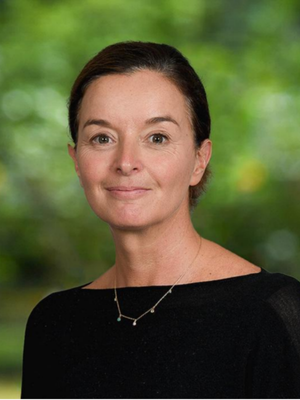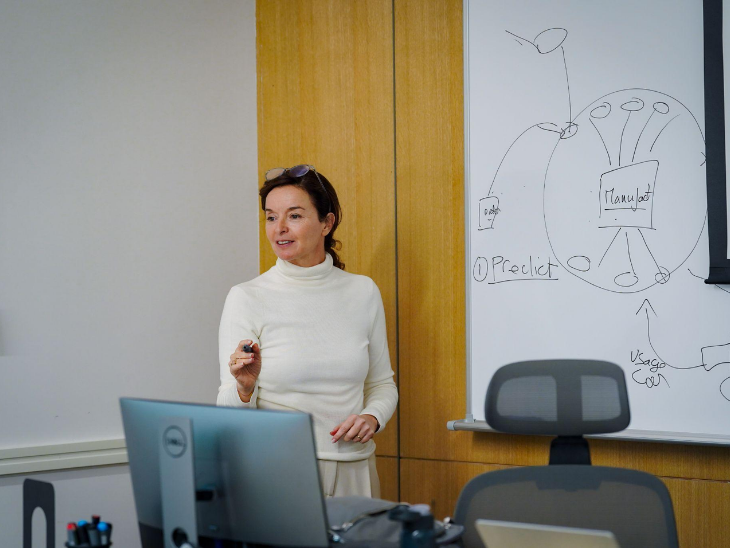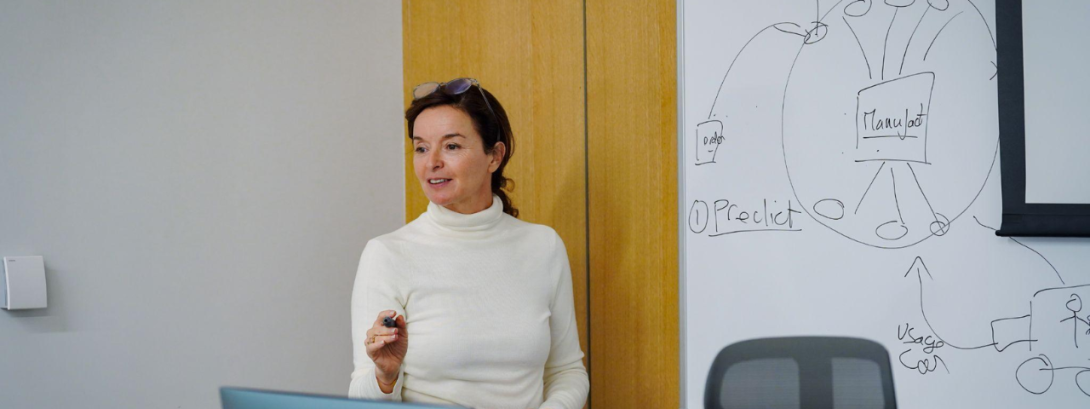Professor Gabrielle Chou taught Generative AI: From Data to Business Workflow in Fall 2024 as part of the MS in Data Analytics and Business Computing (MSDABC) program, jointly offered by NYU Stern and NYU Shanghai. In a recent conversation, Professor Chou reflected on the course’s hands-on approach, its focus on real-world business applications, and how it equipped students with both technical and strategic expertise in Generative AI.

Q: Tell us a bit about your fall semester course: Generative AI: From Data to Business Workflow.
Professor Chou: This course is designed as a hands-on exploration of how Generative AI can be applied to solve real-world business challenges. From the very beginning, students identify a project they wish to build using Generative AI, which becomes the centerpiece of their learning journey. Through the classic frameworks of "Job to Be Done," value proposition design, and product-market-fit, students not only conceptualize their solutions but also actively develop and refine them. By the end of the course, students present a working prototype or concept, demonstrating both their technical and strategic acumen. This immersive approach equips them with practical skills and a deep understanding of how Generative AI can drive business transformation.
Q: You are also a serial entrepreneur in the field of artificial intelligence. Can you share a bit of your work and tell us how your own background and experience help you in your teaching?
Professor Chou: Having founded and built companies like Allure Systems, which used cutting-edge AI for scalable image generation, I bring firsthand knowledge of the AI lifecycle - from ideation to implementation - and the challenges in between! My entrepreneurial journey, particularly in navigating challenges of AI integration and commercialization, allows me to offer practical insights. These experiences enrich classroom discussions with real-world applications, preparing students for the complexities of implementing AI solutions in business.
Q: As an expat who has lived in Shanghai for over 20 years, how do you integrate western and eastern perspectives given the joint nature of the program between Stern and NYU Shanghai?
Professor Chou: Living and working in Shanghai has given me a unique perspective on the intersection of Western tech startup frameworks and Eastern pragmatism. I incorporate this by using case studies from global and Chinese companies and inviting guest speakers from both regions. This joint program leverages the dynamism of Shanghai as a business hub while aligning with the academic rigor and global insights of NYU Stern, creating a balanced approach to understanding AI's role in global business contexts.

Q: How is the curriculum tailored to pre-experience (students straight out of undergrad without work experience) Master’s students?
Professor Chou: The course is designed with early-career students in mind. It builds foundational knowledge in business and technology while fostering critical thinking and problem-solving skills. Assignments, such as the business project, encourage exploration of industry-specific challenges, ensuring students connect theoretical learning with practical application. By focusing on clear frameworks like "Job to Be Done" and practical GenAI tools, students without prior work experience can quickly grasp complex concepts and apply them effectively.
Q: Are there other highlights of the course you want to share (i.e. group projects, case discussion, guest speakers, company visits)?
Professor Chou: Absolutely! Highlights include:
Individual Projects: students research how Generative AI can address challenges in chosen industries, presenting their findings in Week 6 to industry professionals for feedback.
Case Discussions: Weekly case studies, like the application of AI in top Chinese and western companies, contextualize learning.
Guest Speakers: Experts from tech and business share insights on the latest trends and ethical considerations. For example, students had a chance in class to discuss retail digitalization with Jerry Ye, founder and CEO of Whales, an omnichannel marketing platform that transforms marketing operations.
Industry Engagement: Opportunities to visit or interact with companies leading in AI innovation provide hands-on understanding, including the NIO factory in Hefei where students met with the Chief Technology Officer to learn about the latest innovation of this electric vehicle company.


